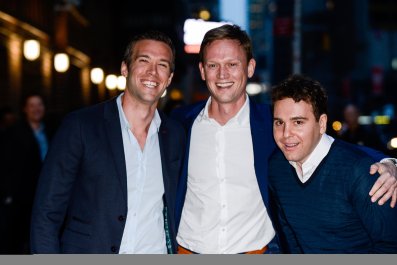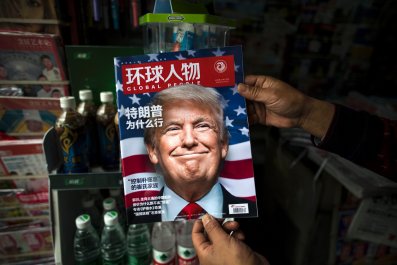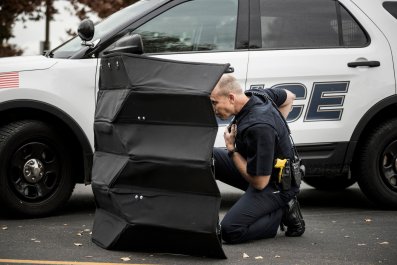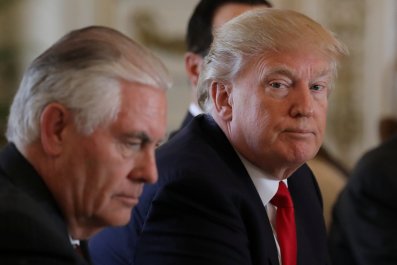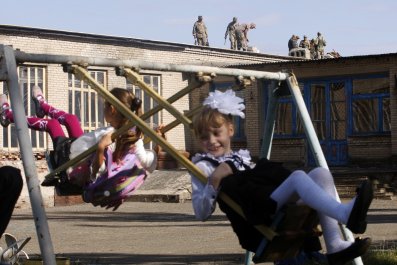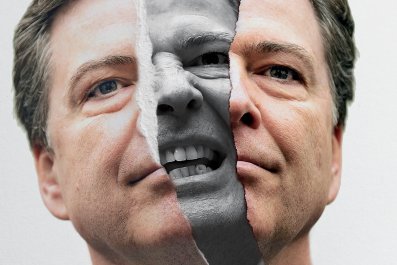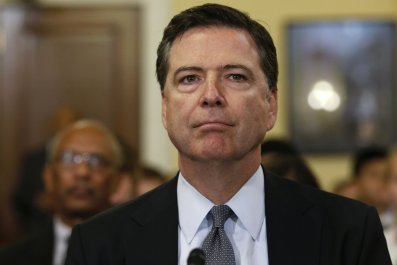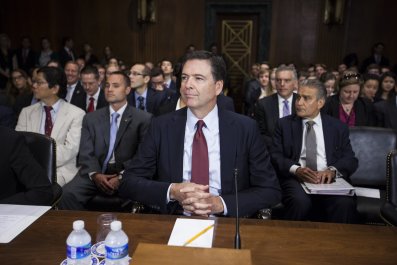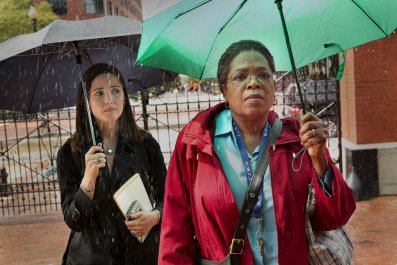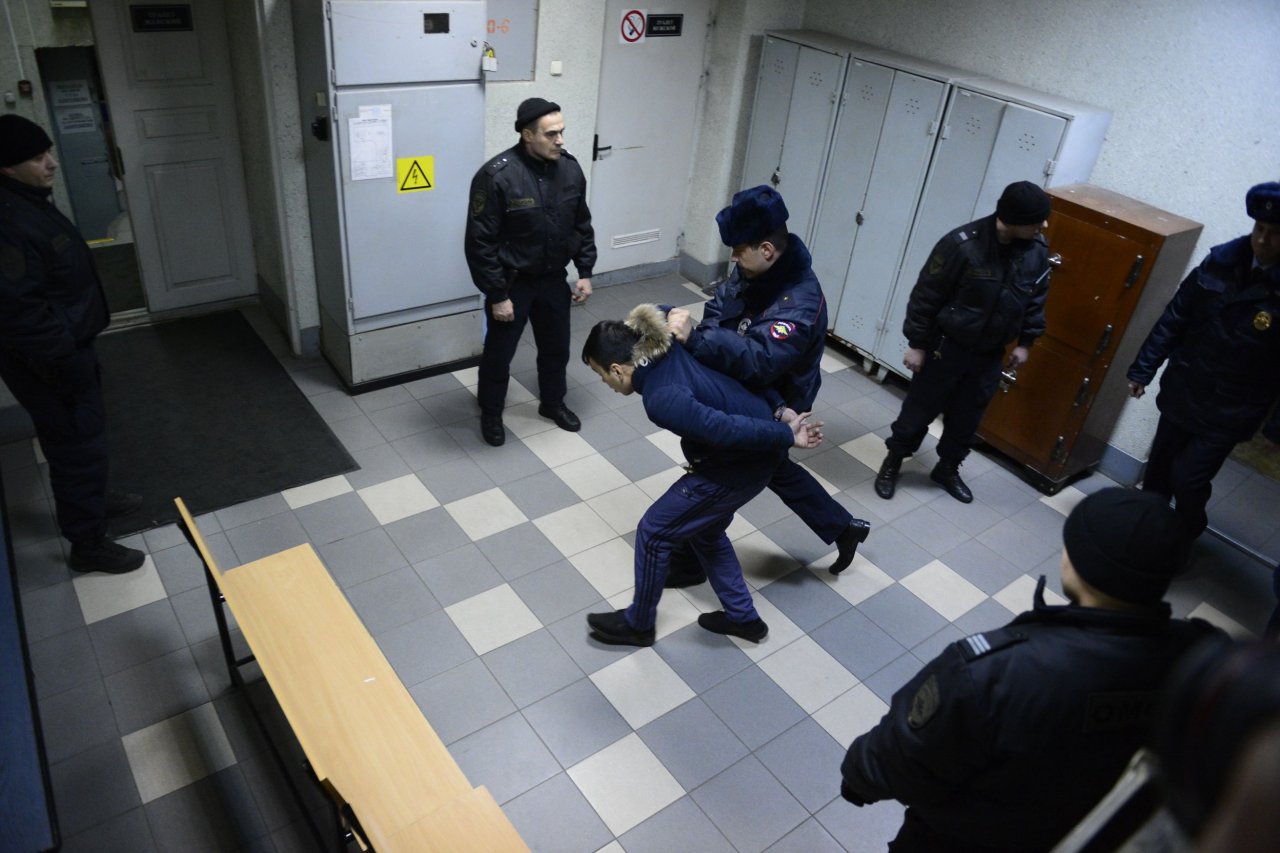
Power, for Vladimir Putin, has always been closely linked to terrorism. Back in 1999, as an unknown and untried prime minister, he first showed Russians his steely character after a series of unexplained bombings demolished four apartment buildings and killed more than 300 people. Putin, in his trademark brand of clipped tough-talk, announced that the those responsible would be "rubbed out, even if they're in the outhouse," and launched a renewed war against the breakaway republic of Chechnya. The resulting wave of approval, stoked by fear of terrorism, carried Putin to the presidency months later.
Eighteen years on and Putin has fulfilled his promise by rubbing out many thousands of extremists—with his army in Chechnya and all over the North Caucasus, via Federal Security Service assassins in Turkey and Yemen, and most recently from the air and by the hand of special forces in Syria. What's more, he has expanded the definition of extremists to include not just Islamist militants but also Ukrainian filmmakers and gay activists who share digitally altered images of Putin in garish makeup on social media. Nonetheless, as the deadly bombing in St. Petersburg's metro on April 2 showed, neither violence nor repression has put an end to terrorist attacks in Russia.
Post-Attack Playbook
Even as the 14 dead and at least 60 wounded were being stretchered out of the smoke-filled Technology Institute metro station and bomb disposal experts carefully defused an unexploded second device, the usual conspiracy theories began to circulate. Murderous jihadis, of course, were most people's default assumption. The St. Petersburg news site Fontanka showed closed-circuit TV images of a bearded Muslim in a skull cap leaving the station, naming him as a prime suspect. He "looks like he stepped right out of a poster for…ISIS," fulminated columnist Denis Korotkov. Ilyas Nikitin was indeed a Muslim from Bashkortostan—but also a law-abiding reserve army captain and Chechnya veteran on the Russian side. Hard-line patriots were quick to blame Ukrainians or supporters of Alexei Navalny, the anti-corruption campaigner who brought some 60,000 protesters onto the streets of scores of Russian cities the previous weekend to protest against government sleaze. Meanwhile, in Ukraine, social media was buzzing with unsubstantiated theories that the bombing was a false-flag attack organized by the Russian state as a pretext for a renewed assault on Ukraine.
RELATED: What to know about Kremlin critic Alexei Navalny's showdown with Medvedev
The Kremlin's reaction was also one Russians have seen many times before. Putin appeared on television looking grim and promising a full investigation, as well as swift retribution for the guilty. Members of the Russian Duma railed against enemies inside and outside Russia. Large numbers of police with metal detectors and dogs appeared at stations, shopping malls and movie theaters across the country in a massive show of force to reassure the public. (There was a difference, though, from the response to the recent attacks in Europe—a glaring absence of international solidarity. No Russian flag was projected onto Berlin's Reichstag, as Britain's had been after an attack on Parliament in March. Tel Aviv was the only Western city to illuminate a public building in the Russian tricolor.)
Another part of the Kremlin's post-attack playbook that was depressingly familiar was using the bombing as an excuse for a new round of crackdowns on dissent. Over the 18 years of Putin's rule, every major terrorist outrage has been followed by a crackdown. In 2004, he scrapped direct elections of governors after Chechen militants massacred schoolchildren in Beslan; in 2010, after suicide attacks on the Moscow metro, he enacted legislation to control the internet; in 2013, when Moscow's Domodedovo airport was bombed, he expanded the definition of extremism to include dissidents of every stripe, from environmentalists to historians.
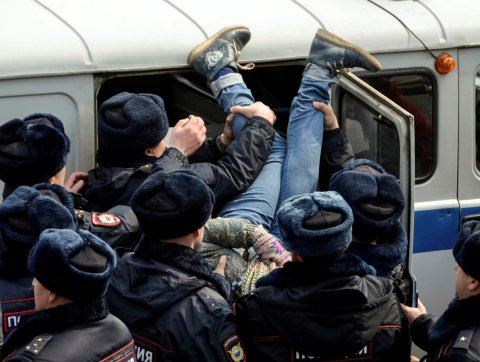
A day after the latest attack, Yury Shvytkin, deputy chair of the Duma's Defense Committee, proposed a moratorium on public protests. Such a move is necessary for public safety, he said, because terrorists time their attacks to "significant events and significant dates…. We should refrain from holding any planned rallies, especially now." At the same time, authorities announced a series of "anti-terror rallies" across Russia. (Shvytkin didn't explain how these would be less of a target for terrorists than opposition marches.) A government source told the Kommersant newspaper that the organizers of the Kremlin-backed anti-terrorist marches would be giving "special attention" to cities that had a large turnout for Navalny's anti-corruption protests on March 26, the largest anti-government rallies Russia has seen since 2011-2012. Another lawmaker, Vitaly Milonov, is introducing legislation that would criminalize online calls for unsanctioned demonstrations and require all social media users to register their passport data with the police.
"No measures can be called excessive if they protect the lives of Russian citizens," a senior member of Russia's National Guard, a 250,000-strong force created by Putin last year for internal security, tells Newsweek . (The source, a former member of the State Duma, was not authorized to speak on the record.) "We are facing the same threat from terror as the rest of the civilized world, yet when we take steps to fight it, we are criticized…. This is pure hypocrisy," the source says. In March, the National Guard created a dedicated cyber division to monitor social network sites and comb the internet for "extremist content" posted online. And last July, Moscow police chief Anatoly Yakunin told journalists that an 86 percent rise in "online extremism" in the capital had been recorded—and that combating extremism would be the Moscow police's "highest priority."
It's not clear how added vigilance of social networks could have stopped Akbarzhon Dzhalilov, the 22-year-old suicide bomber who attacked the St. Petersburg metro. Russian authorities had not identified him as a security risk, and his page on VKontakte, the Russian version of Facebook, shows no obvious links to radical Islamism. The only violence depicted on his pages were videos about combat sports, such as street fighting and boxing, the newspaper Moskovsky Komsomolets reported.
A native of Osh in southern Kyrgyzstan, Dzhalilov was one of the millions of gastarbeiters (guest workers) who have flooded into Russia from the former Soviet empire in search of work. By 2011, he was granted Russian citizenship and moved to St. Petersburg, where he worked in a sushi bar and as a car mechanic alongside his father, also a naturalized Russian. According to the National Guard source, Dzhalilov dropped off the grid in 2015 and apparently became radicalized, though investigators have not established where. One important clue lies in the bomb he detonated. Packed into an empty fire extinguisher, the device may have used homemade explosives based on ammonium nitrate, an ingredient used in industrial fertilizer. The bomb's core had nails and coins taped around it. Authorities discovered and defused another bomb hidden in a black men's bag under a bench in St. Petersburg's Ploshchad Vosstaniya metro station a few hours after the first. The devices "bear some similarities to devices used in Dagestan over the last five or six years," says the source.
Connections to ISIS
Islamist rebels continue to fight Russian authorities in both Chechnya and neighboring Dagestan, despite the best efforts of Chechnya's strongman president, Ramzan Kadyrov. He has won Putin's support and lavish funding, and Kadyrov has been given a free hand to impose his brand of pro-Kremlin Sharia law by ruthlessly crushing insurgents, using methods that include, according to Human Rights Watch, torture and collective punishment of a suspect's relatives. Nevertheless, as recently as March 24, six soldiers from the Russian National Guard were killed and three were injured during an overnight raid by authorities on the village of Stanitsa Naurskaya, on the northern edge of Chechnya.
The deeper problem for Russia is that the Islamists of the Caucasus are deeply entwined with the world's most dangerous dynamo of terrorism, ISIS. Estimates of the numbers of Russian citizens fighting alongside ISIS in Syria and Iraq vary from 2,500 to 7,000, but it's clear Russians are its largest non-Arab group of foreign fighters. Many were even helped by the Russian Federal Security Service to leave Russia and travel to Syria. A special report by Reuters in May 2016 revealed that authorities encouraged dozens of suspected Islamist militants to depart before the 2014 Winter Olympics in Sochi. "I was in hiding. I was part of an illegal armed group. I was armed," Saadu Sharapudinov, one of six rebels identified in the investigation, told Reuters. He had been hiding in forests in the North Caucasus, he said, when FSB officers offered him immunity from prosecution, a new passport under a new name and a one-way plane ticket to Istanbul. Shortly after arriving in Turkey, Sharapudinov crossed into Syria and joined an Islamist group that would later pledge allegiance to the ISIS.
Exporting troublemakers worked in the short term. There were no attacks on the Sochi Olympics, despite it being just a few hours' drive from Chechnya. And violence fell all over the troubled North Caucasus in the past few years. "The departure of Dagestani radicals in large numbers made the situation in the republic healthier," Magomed Abdurashidov, of Dagestan's anti-terrorist Commission of Makhachkala, told Reuters.
But the problem remained of what to do with these jihadis if and when they come home, now trained and battle-hardened by ISIS. Russian security officials frequently cite fighting terrorism as one of the main reasons for Putin's decision to start bombing the forces in Syria fighting against President Bashar al-Assad in September 2015. "There are thousands of our citizens fighting there," Nikolai Kovalev, head of the FSB from 1996 to 1998 and now a member of the Duma Security committee, told Newsweek in January. "It's a matter of national security to make sure that they don't bring that ideology back to Russia." Leonid Kalashnikov, chairman of the Duma Committee on the Former Soviet Union, agreed: "We remember how many radicals came to fight in Chechnya from the Middle East. The region is right next to Central Asia. That is our underbelly. We have to be in [Syria] in order to prevent the contagion of terrorism from spreading."
Putin's bombing campaign did kill ISIS militants. How many isn't clear. Ashton Carter, then the U.S. secretary of defense, told NBC in January that Russia had done "virtually zero" against ISIS in Syria. Days after Russian bombers began their campaign in Syria, Wilayat Sinai, a new ISIS affiliate in Egypt's Sinai Peninsula that had been affiliated with Al-Qaeda, decided to attack a Russian target. Abu Muhammad al-Adnani, emir of ISIS in Syria and the group's official spokesman, released an audio message on October 13 urging Islamic youth everywhere to "ignite jihad against the Russians and the Americans in their crusaders' war against Muslims." Wilayat Sinai was ready to answer the call. The group had infiltrated a recruit into Sharm el-Sheikh airport's team of baggage handlers. In the early morning of October 31, 2015, the airport insider smuggled a soda can packed with explosives into the hold of a Russian charter plane bound for St. Petersburg, just below seats 31A and 30A, window seats occupied by 15-year-old Maria Ivleva and 77-year-old Natalia Bashakova. Twenty-two minutes after the Metrojet Airbus pushed back from its stand, the bomb detonated, killing all 224 on board. The Metrojet bombing remains ISIS's deadliest attack to date.
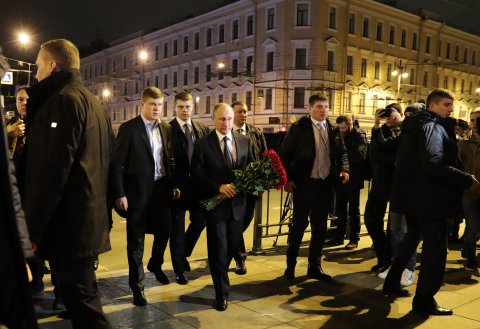
Other groups inside Russia also heeded Adnani's call. In June 2015, Amir Khamzat, one of the most wanted Islamist rebels in the North Caucasus, defected from a group previously linked to Al-Qaeda and pledged loyalty to ISIS. Today, two main Islamist groups vie for control of Russia's homegrown rebels: the Caucasus Emirate, which is affiliated with the Nusra Front, and the Caucasus Governorate, an ISIS affiliate under the control of Dagestani Rustam Asilderov, also known as Abu Muhammad al-Kadarskii. They are united by a shared hatred of two things, Shiites and Putin's Russia.
Whether ISIS, via its affiliates in the Caucasus or elsewhere, was behind the St. Petersburg attack remains to be proved. According to Kommersant, the FSB had arrested and questioned a Russian man with ties to ISIS, after he returned home from fighting in Syria, and he warned of an impending attack. The man was "low in the organization's hierarchy and did not have a complete picture of the situation," according to Kommersant 's "trusted security source," so the FSB was unable to take more concrete action.
Propaganda Demonizes Dissidents
The key question is whether this is a one-off attack or the start of a major campaign against Russian targets. And would a sustained terrorist campaign undermine Putin's regime or strengthen it?
Putin has proved his ability to withstand terrorism. After the Metrojet bombing—a massive attack that would have sparked a major political crisis for any Western leader—he used his well-honed propaganda machine to whip up more public support for his Syria campaign, in the guise of protecting Russians. Putin has maneuvered himself into a position where any threat to Russia—whether it's sanctions following his annexation of Crimea or the St. Petersburg bombing—becomes just another argument for why Russia needs a strong leader. What's more, it makes his critics, such as the thousands of young people who turned up to protest corruption in March, not just dissidents but dangerous traitors, criticizing the president when their country is under threat. State Duma Speaker Vyacheslav Volodin called on lawmakers to defend Russians against Navalny and his vocal anti-corruption campaigns, referring to him as "the voice of the Western security services."
At the same time, Russia's diplomats have used the attacks to move the international conversation away from Ukraine and Moscow's alleged meddling in Western elections to the shared problem of terrorism. The St. Petersburg bombing illustrated "the importance of stepping up joint efforts to combat this evil," Foreign Minister Sergei Lavrov told journalists.
Putin's reputation was built on being tough on terrorism. Over the years, says Brian Whitmore, author of Radio Free Europe's influential blog The Power Vertical, "power has been consolidated, dissent has been suppressed—and terrorism has continued." And throughout it all, Russians keep looking to the Kremlin for protection.



